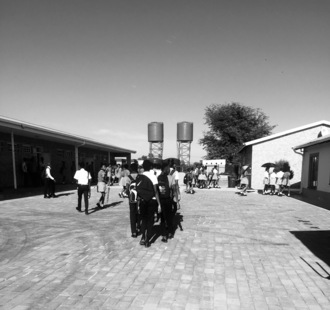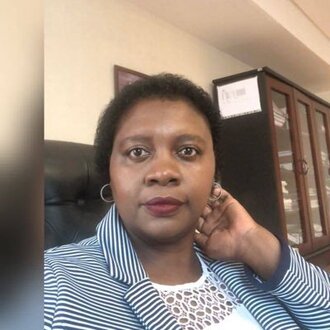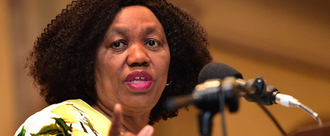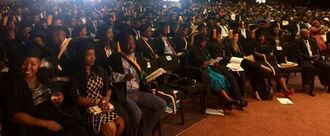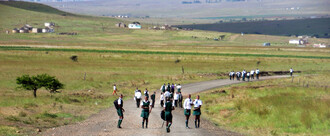- Featured
- Clean air
- Climate justice
- Consumer Rights
- Corporate Accountability
- Data access
- Early Childhood Development
- Economic fairness
- Education
- Electoral fairness
- Environmental justice
- Food justice
- Gender based violence
- Grants/social assistance
- Health
- Housing and infrastructure
- Industry interference
- Land Justice
- LGBTQIA+ rights
- Media/ information access
- Public transport
- Racism
- Reparations
- Safety
- Sanitation
- Service Delivery
- Sexual and Reproductive Rights
- Social justice
- Unemployment
- Womxn's rights/ gender equality
- Workers' rights
- More
-
Call Gauteng MEC of Education to place social workers in rural schools in HammanskraalThe schools located in low-income areas face the challenge of, Vulnerable family structure( skipped generation households and child headed households). This has a negative impact on how the students perform at school and survival is usually prioritized above school work [3]. Therefore there is a need for a social worker to identify students from these households and offer them support so that they can get the best out of their education [2]. Since social workers are social advocates they can connect students/parents with the right stakeholders. They can workshop around issues that make it difficult for students to participate fully in the classroom [1]. They can make the school environment more conducive to learning. They can hold meetings with parents and community members for the overall benefit of the student. Call to action: Sign this campaign now to ensure that the MEC of Education, places social workers at rural schools in hammanskraal. Our main objective is for students to thrive and succeed, but they are weighed down and overburdened by the family structures they find themselves in;causing them to not perform at their best. By signing this petition you will help us get the MEC to place a standing social worker in rural schools in Hammanskraal. The social worker will act as a facilitator between the community and the school, a social advocate to ensure that students get the best out of their education and a support system for teachers,providing them with tools needed to support at risk students. Together we can guarantee that our students maximize their opportunities but we need to remove barriers to their education. Sign now and make a difference. References [1] https://socialworklicensure.org/articles/become-a-school-social-worker/ [2] https://msw.usc.edu/mswusc-blog/what-is-a-school-social-worker/ [3] https://borgenproject.org/what-is-the-relationship-between-poverty-and-learning/ Helpful Statistics and Readings https://mobile.twitter.com/StatsSA/status/1133299234579648513?ref_src=twsrc%5Etfw%7Ctwcamp%5Etweetembed&ref_url=https%3A%2F%2Fd-96 https://journals.co.za/content/journal/10520/EJC-1399f14fb9141 of 200 SignaturesCreated by Malebo Masemene
-
Tell Thembeni Mhlongo to build a public creche in Windsor WestIt is unrealistic to expect that community members in poor and low income areas will be able to provide suitable crèche’s in line with the requirements of the Department. The particular requirements in infrastructure, safety regulations, health standards, teacher qualifications, and high standards of education and as well as capacitated organisations are an unrealistic expectation for these communities. This was echoed by the words of crèche principal, Georginah Hloka in a meeting held on the 29th of October 2019 with the Department of Social Development, Department of Health and the Department of Education in Tembisa Township [1]. How can crèche owners then provide adequate toilets, proper infrastructure, provisions for disabled children, nutritious food, qualified teachers, physical safety features and adequate space for children if community members cannot even afford to pay a R1000?This then means that the whole idea of private crèche’s can never really work in poor and low income communities [2]. Research shows that the improvement of pre-school learning in the country came when grade R learners were incorporated into the public school system and became housed in primary schools [3]. Grade R is however only for five year olds and six year olds. This means that, for poorer communities, provision of pre-school education by the public government is better than that of private providers. The same is not true for affluent neighbourhoods however. This is why we are calling for the Gauteng’s Head of the department of social development to rather build public crèche’s as private crèche’s are not sustainable in poorer areas. What is moreover disturbing about the poor quality of pre-school education for black children is that the children who of the race group that needs the most support in order to reduce rates of inequality in the future as they are shaped by race and gender, are the children whose development is being stunted all the more. Research shows that poor nutrition, poor learning environment and low standards of teaching are the main cause of why children from poor backgrounds generally perform worse than children from upper and middle classes[4]. The DSD MEC needs to stop this plight and push for decision making to rather build public crèche’s as opposed to trying to shift the responsibility of educating the poor to community members who are structurally unable to play this role. [1] Township crèches must now register, says government: https://www.sowetanlive.co.za/news/south-africa/2019-10-29-township-crches-must-now-register-says-government/ [2] Raising South Africa: informal crèches are desperate for aid: https://www.groundup.org.za/article/raising-south-africa-informal-creches-are-desperate-aid/ [3] impact of the introduction of grade R on learning outcomes: http://resep.sun.ac.za/wp-content/uploads/2014/06/Grade-R-Evaluation-1-3-25-Final-Unpublished-Report-13-06-17.pdf [4] Challenges of the Early Development Sector in South Africa by Michaela Ashley Cooper, Eric Atmore and Lauren Van Niekerk 2012. The Journal of Early Childhood Development Journal. The University of Johannesburg.164 of 200 SignaturesCreated by Zintle Tyuku
-
Get Minister of Basic Education to prioritize placement of more social workers in Mpumalanga.South Africa is classified as one of the most violent nations in the world [1], so it should not come as a surprise that the violence has wormed its way into schools, affecting the most vulnerable group in our society. This past year, there’s been a lot of reported school violence, from the killing of a learner at Forest High School, to the gunning down of a teacher at Masuku Primary school [2] In June last year, Patti Silbert and Thembeka Mzozoyana published an article in the Daily Maverick discussing and highlighting the importance of making counseling accessible to all South African Youth, more especially learners in schools [3]. Furthermore, Angie Motshekga revealed to the Basic Education and portfolio committee that schools placed in high crime rate communities experience high rates of violence [4]. Upon revealing this, the Minister promised to implement programmes aimed at tackling the issue of violence in schools and to this date, we have not seen any significant, visible implementations. The recent annual performance plan from The Department of Social Development mentions challenges existing in each province. One of the challenges mentioned was ‘the plight of qualified but unemployed social worker graduates’ [5], which tells us that there are available unemployed Social workers. It does not come as a surprise that in that annual performance plan meeting, the MEC of Mpumalanga, a province with the most reported incidents of school violence [4], mentioned the need for more social workers and support for early childhood development in the province in the province [5]. The Department of Basic Education regards social workers to be members of a multi-disciplinary team. A multi-disciplinary team placed at district offices, away from schools. Currently, the team only gets involved if and when there’s an issue affecting the academic performance of the child [6]. What we need is school social workers, people within immediate reach of children, people who are bound to have a quick response to the issues involving children. In 2015, there were only 4 social workers placed at District level around Mpumalanga (this excludes the social workers hired by SGBs and Churches) [6]. It certainly comes as a shock that a province with 17 municipalities only had four social workers hired by the Department of Basic Education while there’s said to be a lot of unemployed social workers [5]. The DBE policy emphasizes care and support for learning, the policy also states that in order for this to be achieved, a multi-sectoral approach is required [7]. This means that the department is mandated to seek help from other sectors/departments in order to ensure the holistic well being of all children. In last year's annual report meeting, the Minister of Basic Education mentioned that they have entered into a partnership with the department of social development to ensure the placement of school psychologists and social workers, but no time frame was provided [8]. The department is evidently aware of need of social workers in schools. We just need them to attend to this matter urgently, and as promised. Sign this campaign to ensure that the well being of our children in schoolsi is prioritized and that every child gets quality education regardless of their backgrounds. If enough of us come together in the signing of this petition, it would force the minister to see the seriousness of the situation and attend to it urgently. That will mean that our children will get free cancelling in schools, and will be professionally equipped to deal with any issue affecting them socially, academically, psychologically, etc. REFERENCES [1] South Africa is one of the least safe countries in the world. Staff Writer at BusinessTech 24 November 2019 [2] School Violence : What Govt is doing to keep our children and Teachers safe. Kayllynn Palm for EWN 20 June 2019 [3] Legacy of youth protest sees learners scarred by mental health issues. Patti Silbert and Tembeka Mzozoyana for Daily Maverick 13 June 2019 [4] Motshekga reveals 1345 hotspots for school violence. Edwin Naidu for IOL 15 September 2019 [5] Department of Social Development 2019/20 Annual Performance Plan; with Minister https://pmg.org.za/committee-meeting/28602/ [6] South Africa. Department of Basic Education. 2010a. Care and support for teaching and learning. Pretoria. [7] Social Workers’ perceptions of their role within the framework of Inclusive Education. HW can Sittert November 2016 https://pdfs.semanticscholar.org/eb3f/65aa35f5d68f5b02eacef7ea99a65cae27aa.pdf [8] Department of Basic Education 2019/20 Annual Performance Plan, with Minister https://pmg.org.za/committee-meeting/28524/1,752 of 2,000 SignaturesCreated by Tebogo Gabang

-
Add your name to assist Wits students owing more than R20 000 to registerLungelo Malevu, holding a BSc in Biological Sciences is one of many from Wits University who currently have historical debt “I owe R135 893.28 and the university has withheld my degree and I only have access to my unofficial transcript. This is a challenge because I cannot apply for a number of jobs since there is no proof that I have completed my degree” Portia Mosime, hoping to register for her final year in Psychology “my mother is unemployed but we survive through the money she makes from her vegetable garden which supplies her community with fresh veggies, however she makes less than R500 a month this is not enough to cover the outstanding debt at Wits amounting to R76 117.81” Students often financially excluded from institutions of higher learning are black female students from previously disadvantaged backgrounds. They account for close to 58% in universities and 57% in TVET colleges [4]. The lack of access to funding opportunities for higher learning affects them the most. Following the efforts made by the SRC and other important organizations, these testimonies should motivate people to add their names to this campaign to put more pressure on the financial committee (FinCo) as they are the ones responsible for determining the fees to be paid by students. Ultimately this should end the unequal access to institutions of higher learning affecting poor black South African youth. The efforts by NSFAS and other funding schemes can only assist a certain number of students, this further reduces the rate at which graduates enter the job market. Despite unemployment rates being high, the critical work of doctors and nurses requires a surplus of recent graduates based on the demands of the job. If a medical degree student fails to clear their historic debt they cannot graduate and enter the job market, potentially changing people’s lives. These dreams end up not being a reality. Therefore, the more support this campaign gains, the fight against academic exclusion due to finances is kept alive, students around this time are in distress and often end up further getting themselves into more debt and stress way before the academic year starts. Adding your name to this campaign at this moment ensures that the relevant decision makers can act now and implement these demands before the month comes to an end. This means that students with historic debt can continue with their studies. References [1] Wits Vuvuzela, 2019 Accessed here: https://www.wits.ac.za/registration/returning-undergraduate-students/ [2] Takalani Sioga for the Wits Vuvuzela. 3 August 2018. Accessed here: https://www.witsvuvuzela.com/2018/08/03/nsfas-tells-2019-applicants-to-wait/ [3] Michael Pedro for EWN, 2019. Accessed here: https://www.google.com/amp/s//ewn.co.za/2019/03/24/dhet-allocates-r697m-to-nsfas-to-settle-historic-debt-owed-to-universities/amp [4] South African Market. 12 November 2019 Category: Education accessed here: https://www.southafricanmi.com/education-statistics.html346 of 400 SignaturesCreated by Thabisile Miya
-
Universities should not withhold certificates of impoverished graduatesThe vice-like grip on graduate certificates by universities frustrates not only the graduates but also their entire families. These certificates, to black families, represent a symbolic break with generational poverty. The documents are an inspiration to their siblings, hence they are hung on the walls in our homes as a reminder and motivation that hard work pays off. Our universities are still mercilessly holding on to certificates of many graduates who cannot afford to settle their tuition fees due to unaffordability as South Africa is suffering from high levels of unemployment hence many graduates are still unemployed to this day. The manner in which institutions are behaving towards their alumni is no different from loan sharks who would hold on to identity documents and bank cards of their victims - so that they are condemned to perpetual poverty and debt.There is no valid reason why universities are holding on to certificates when they can resort to debt collectors and other means to get debts settled. Remove this unnecessary hurdle by giving all graduates their certificates and use other means to get the debts settled.#ReleaseGraduatesCertificates8 of 100 SignaturesCreated by Chabana Chabana
-
Mweli, Make Gender and Sexuality Studies Compulsory in teacher training programsKarabo Mafolo of the Daily Maverick reports that “In a 2016 report, the LGBTI organisation OUT LGBT Well-being, reported that 51% of transgender people had experienced discrimination in their education life.” This year, there was an mass hysteria about the new curriculum introducing “masturbation” as part of the new Life Orientation curriculum for grade 4 according to a misleading article by Prega Govender in The Sunday Times, 12 May 2019. This sparked the conversation on social media platforms where the concern wasn’t necessarily the introduction of sex and gender education but the level of engagement. More concerning however, is that there is currently no steps being taken to ensure that the very educators of the current and new Life Orientation curriculum are being trained to formally and professionally Gender and Sexuality Studies. The Department has previously displayed a strong capacity to retrain teachers when the CAPS curriculum was introduced in 2011. Met with great reluctance from teachers, Bongani Nkosi of The Star reported that the CAPS curriculum was implemented, reviewed and monitored - meaning the Department of Education is able to introduce gender and sexuality as part of current and future training for firstly Life Orientation teachers, and gradually, a compulsory training program for any teaching qaulification. It is the responsibility of the Department of Education to prioritize Gender and Sexuality to create inclusive, intersectional and informative learning environments starting with the teachers and filtering it down to scholars and the wider community Sources 1. Department of Education (www.education.gov.za) - Director General of Basic Education 2. Bongani Nkosi, The Star, 7 September 2018 3. Prega Govender, The Sunday Times, 12 May 2019 4. Karabo Mafolo, The Daily Maverick, 4 June 2019215 of 300 SignaturesCreated by Kay Ntshulana-Bhengu
-
Improper infrastructure is affecting the quality of ECD education in the Gauteng ProvinceI have had the opportunity of working with an Early Childhood Development (EDC) centre situated in Freedom Park. The owner was a dedicated strong woman who exhausted all her resources to ensure a safe haven for the children regardless of how poor her facility was. Her distress was that she had been operating an unregistered crèche for three years and her one need was to find someone to meet her half way in order for her to fix the infrastructure to qualify for certification. As this was an urgent matter and the children were at risk; we worked tirelessly to secure sponsorship by approaching different corporates. At the end of six months, we had succeeded and the ECD facility was child friendly, complied with the requirements and they were successful in registering. This ECD centre , was like the many others which are currently operating without proper infrastructure. Fortunately for this one funding was awarded; other ECD centres take years to receive funds or to even raise enough finances for important resources. In fact; within the Gauteng province alone, the Department of Social Development has identified 1100 ECD centres that are unregistered [1]. It has almost become a way of life that individuals within the community will establish a business of an unviable ECD facility with good intentions of servicing the community. This however doesn’t move away the fact that the facility still endangers the lives of children and that there's high risks. It is unfortunate that; even with the President’s promise of quality early childhood education during the 2019 State of Nation Address [2]. These promises will never be realised if there’s infrastructural problems hindering the realisation of quality education services. At the forefront of the Department of Social development’s plan to register ECD centres lies the requirement that an ECD centre, in order to be eligible for educator training, funding and benefits; must meet infrastructural requirements on the time of its registration. Yes, the government does provide an operational subsidy of R15 a day per pupil but the subsidy is restricted to facilities that comply with the norms and standards on its infrastructure [3]. Which means that those children in the most disadvantaged communities do not even benefit from this. Barbara Stemment head of Early childhood development at Ikamva Labantu states that “it is not that people don’t want to register but they don’t because they cannot afford to meet the infrastructural requirements set by the department [4].” She further explains that if the ECD centre shuts down; then where will those children go? Therefore, it is unfair to expect informal ECD facilities to meet infrastructure requirements when there is no identifiable government programme/subsidies for financing the construction or upgrading of facilities. It is key to note that the government has abdicated itself from financing the infrastructure that serves as a basis for accessing the operational subsidy and this proposes a problem. With the new changes on early childhood development education having had migrated to the Department of Basis Education; the question is: how will quality education be realised if there are infrastructure challenges already crippling the basic education system? And how will unregistered ECD centres due to infrastructure challenges be incorporated into the government’s current infrastructure improvement plans? This year marks the 20th celebration of National Child Protection week in South Africa. An annual campaign of the South African government to promote a culture of respect for children’s rights and an awareness of child safety [5]. However, if early childhood development programmes are performed in poor facilities then the safety, stimulative and quality learning is not achieved. Can we then say that as citizens we’ve made it our duty to protect and create a safe and secure environment for children in informal crèches? While the commitments of the government to introduce a two years compulsory ECD programme were welcomed as great improvements at the 2019 State of Nation Address; seriousness will only be realised if at the heart of the Department of Basic Education ‘s budget allocation is a share dedicated to a body that will specifically be targeted at early childhood development and tackling the infrastructure dilemma costing the success of the quality of education. Therefore, the department’s interventions should include Infrastructure challenges of unregistered ECD centres and helping these facilities be compliant. The first six years of a child's life are of paramount importance and in order to realise quality education for any child requires quality facilities and we ought to always remember this. Words to remember : "There can be no keener revelation of a society's soul than the way in which it treats its children."- Nelson Mandela. • ECD Centres – Early Childhood Development Centres. • DSD- Department of Social Development • DBE- Department of Basic Education • MEC – Member of Executive Council • Joburg Metro- City of Johannesburg Metropolitan Municipality References: [1] “Over 1,000 unregistered crèches in Gauteng,eNCA, 5 April 2019 https://www.enca.com/news/over-1000-unregistered-creches-gauteng [2] SONA gives hope for early childhood development, David Harrison, 11 February 2019, https://www.iol.co.za/pretoria-news/sona-gives-hope-for-early-childhood-development-19237438 [3] Obstacles for ECDs , Jess Drewett, 30 April 2018, http://livelihoods.org.za/2018/04/30/obstacles-for-ecds/ [5] Barbara Stemment , ikamva labantu, 18 December 2019, https://ikamva.org.za/ [4] Child Protection Week 2019, South African Government, https://www.gov.za/ChildProtectionWeek2019 Picture: https://www.groundup.org.za/article/raising-south-africa-informal-creches-are-desperate-aid/241 of 300 SignaturesCreated by Matshidiso Mabe
-
We demand trained staff members at UNISA - Durban main campusThis is important because; • Durban is very diverse, students who come from deep rural areas need to be catered for in a manner that levels up with their current knowledge. • Students must be given valid and significant information that does not mislead them on their academic choices. • .To avoid students from travelling all the way to Gauteng, in order to get their queries attended to, and fixed. • To ward-off the confusion students have and put them at ease with their studies which will also improve their academic performances. • To avoid students from wasting time and money by taking modules which are not required for their qualifications. •Qualified and well-trained staff members can make UNISA one of the best universities in Africa.139 of 200 SignaturesCreated by Nonhlanhla Cynthia Mhlongo
-
Tell Panyaza Lesufi to remove any hair policies in Gauteng schools that are discriminatorySchools are institutions of learning and not only learning about modules placed in curriculum's but also raising and emphasizing the importance of self-discovery and identity. Students need to learn more about themselves as well as their cultures and then teach others about it. When we teach young black girls that their hair has to be changed so they can suit a certain school culture what are we teaching them about themselves and how they were born? Schools should embrace the black culture and not try to change it. Most of these schools implemented their hair policies way before African black children were allowed into the then-White-only schools so they are not very inclusive of the black culture and the way African hair grows.Were the hair policies of schools reviewed after Apartheid and changed to suit everyone's hair needs? Each school can have different policies and school cultures as long as black pupils do not feel like they are being prejudiced against how they look as Africans. Schools need to also enforce educating themselves on African black cultures and how the African hair grows if they continue to enforce hair policies. [1] Pretoria Girls High pupils were victims of racism-MEC, Lizeka Tandwa for News24, 2016/12/03 [2] Gauteng High School embroiled in natural hair scandal, Silindelo Masikane for the eNCA, Monday 11, March, 2019 [3] Several State & Private Schools have bans on Dreadlocks. Afros and braids, Prega Govender for Mail & Gaurdian, 02, September, 2016 [4]School Governing Bodies: Play your part, Department of basic education 2019 [5] Lesufi gives Kempton Park school deadline to change hair policy, Nation Nyoka for News24, 25/07/2017415 of 500 SignaturesCreated by Matheko Ramolefo
-
Implement proper measures to monitor and run efficient scholar transport in KwaZulu-Natal1. Many children in rural KZN even in our current times still walk for more than 5km to school. KZN has the highest proportion of children walking to school. Scholars are incorrectly classified at the department of education as attending the school of choice and not that that is closest to home. Learners have difficulty concentrating and staying awake in class due to waking up early and walking long distances on an empty stomach. Children walk on gravel and curvy mountainous area making it dangerous for the children walking especially girl children. Children rely on minibus taxis and bakkies for transport. In 2017 alone 10 pupils died and more than 90 were injured using these modes of transport. It is important that children are given access to safe transportation from home to school to allow them their right to education and safety. 1. The Long walk to school. Nkululeko Nene for IOL. 17 September 2017132 of 200 SignaturesCreated by Zanele Cindi
-
Tell MEC Nkakareng Rakgoale to build a center for the Gogogetters in MusinaBuilding a center for the Gogogetters is part of the Department of Social Development’s mandate to deepen social assistance and enhancing the capabilities of communities to achieve sustainable livelihoods and household food security[2]. It is important because old people are seen as a liability, while in actual fact they can have a big impact on social and economic prosperity locally and globally. Gogogetters are lacking recognition because of the pervasive negative perception of ageing hence, they are finding it hard to build a center for themselves. The Musina Local Municipality has since given the Gogogetters land to build a center but because of financial difficulties, they are unable to utilize the land. Gogogetters are ready to venture into entrepreneurship because it is an important role in the country’s development. The center will boost the economy of Musina and attract more tourists as it is one of South Africa’s special economic zones. Looking at the 2019 Statistics South Africa’s Quarterly announcement of unemployment rate in the country, it has increased to 27,6% hence such an initiative is for a good cause as it will help deal with unemployment challenges [3]. The budget from Social Development is not enough and this campaign is calling upon the newly elected MEC for Social Development in Limpopo,Nkakareng Rakgoale to make sure the budget allocated for Gogogetters is increased to enable the building of the center that the Gogogetters have been longing for the past 3 years. Let’s come together and signing to join this campaign to ensure MEC Nkakareng Rakgoale builds a center to better the lives of Gogogetters. Namadzavho Mukona is a 69 year old Gogogetter whose life has been positively changed by this organization. She says because of Gogogetters, “I no longer get sick by always sleeping at home doing nothing. The activities we do at the Gogogetters are keeping me active and healthy”. References [1] South African Year Book, Social Development 2016/2017 [2] Investigative Hearing into Systematic Complaints Relating to the Treatment of Older Persons, South African Human Rights 09 June 2015 [3] SA’s Unemployment rate spikes, Sarah Smith of Mail &Guardian 14 May 2019128 of 200 SignaturesCreated by Sanra Mbedzi
-
Save the Athlone Cultural Hub and the CWD building at 146 Lawrence rd, AthloneIn the days of apartheid, when many turned their backs on activists, the Catholic Church provided refuge, provided a source of comfort to the families of Coline Williams and Robert Waterwich. The youth from UDF's Wesco (Western Cape Student Congress) met regularly at the CWD premises, as did YCW (Young Christian Workers) and several other youth and community organizations. Activists on the run from the apartheid state were given refuge. It is now a space for the working class to engage in cultural activities such as music, art, yoga, the study of history and the history of Table Mountain. The CWD Executive wants to close the building. It is already a community that has few spaces for Culture. It should remain a living cultural space and heritage site. Please sign and share this petition. In addition, for over 50 years the CWD projects operated from this centre and elsewhere. Tens of thousands of people were assisted. There were social workers; there was training for Early Childhood Development. There was a sewing project that brought together refugees with local workers. It housed the science laboratory of the legendary St Columba's school. The residence for the teachers was housed upstairs on site. Over the past three years the then Arts and Culture manager, Andre Marais has managed to build up the Athlone Cultural Hub. Under his stewardship the Western Province Mountain Club is now housed in the building. They take youth of the area up Table Mountain and give talks about the history of the mountain. The Academy of Music has their administrative office on the premises. A jazz band, with local artist Trudy Rushin, have their practice sessions on site. The Revolutionary Yoga group operates at the Hub. There is also a dance club. There is a library of 30 000 classics and 10 000 movies. There have been several cultural activities held. There have been several education schools run by UCT Summer School. There is a corner for volunteers to read children stories. A memory garden has been started for Coline Williams and Robert Waterwich, who were killed in the struggle against apartheid. Robert was a former student of St Columba's and he would have used the laboratory. On the 13th February 2019 three rooms were renamed after the Trojan Horse 3. The library has been named after Shaun Magmoed. The section where the social workers used to operate, in front, has been named after Michael Miranda, while the upstairs section which used to be the dormitory of the teachers and lately was the section that housed the ECD, was named after Jonathan Claasen. Retired teachers are prepared to run free maths and science classes on site. A local resident is prepared to offer free carpentry classes. There is a strong case for the building to be declared a living heritage site, especially now that a funder has stepped forward that has offered to cover running costs, including that of Cultural Hub manager. Help us keep the building open.456 of 500 SignaturesCreated by Save the Athlone Cultural Hub
.png)
